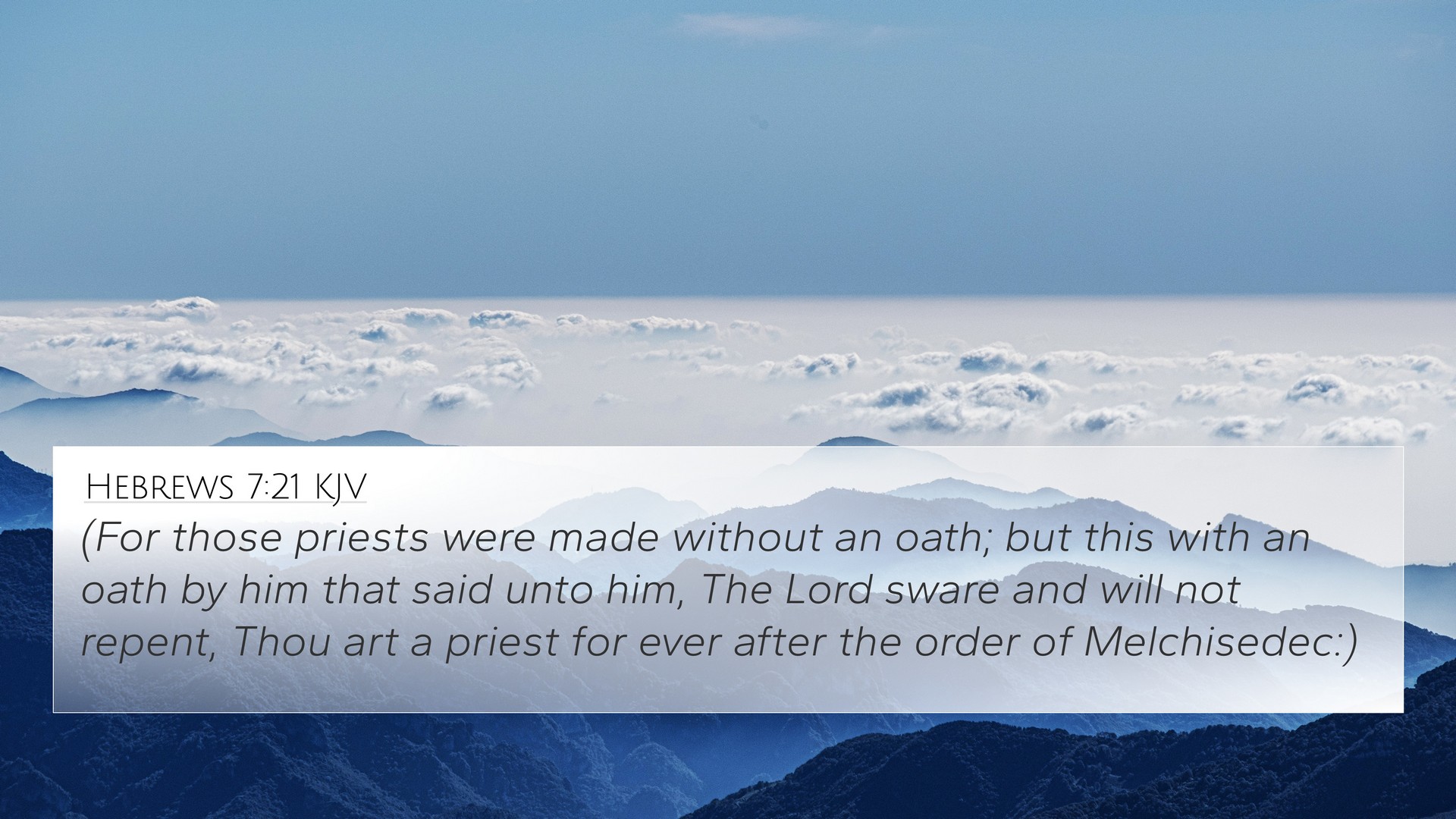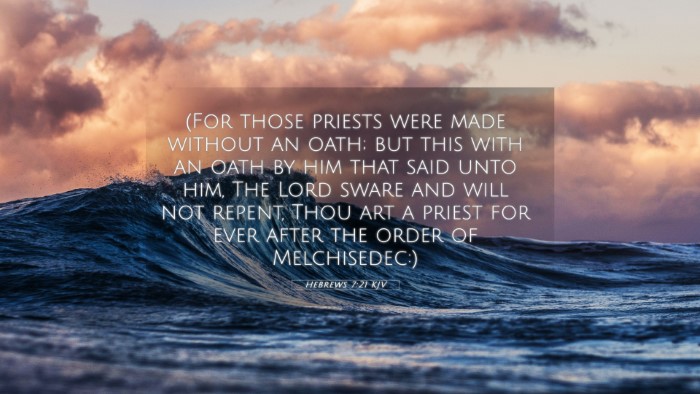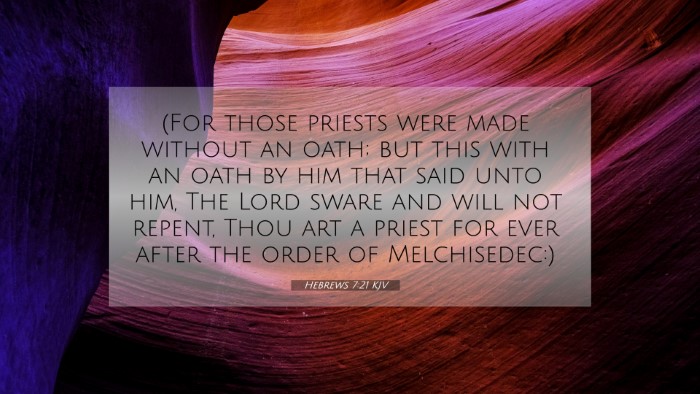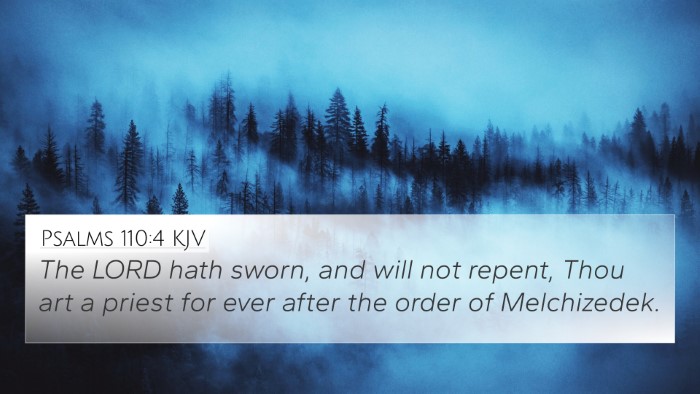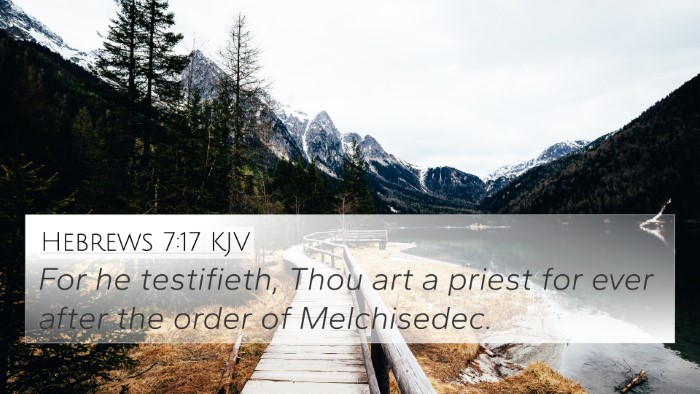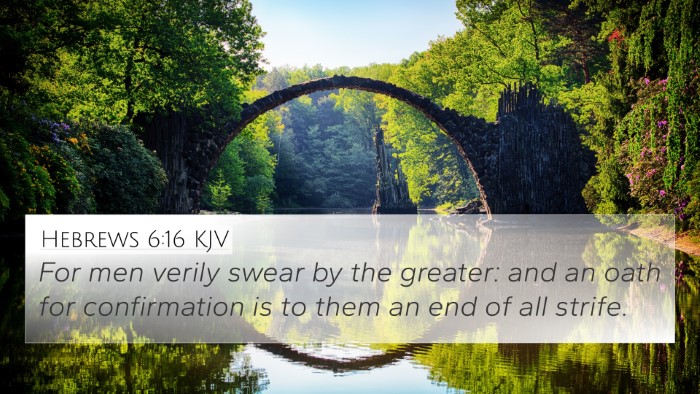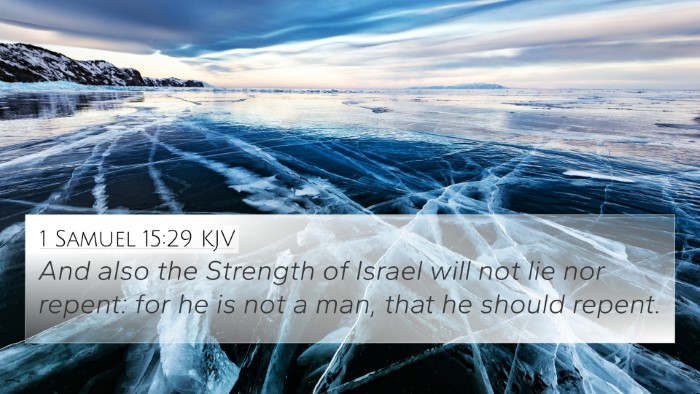Understanding Hebrews 7:21
Key Verse: Hebrews 7:21 states, "For those priests were made without an oath; but this with an oath by him that said unto him, The Lord sware and will not repent, Thou art a priest for ever after the order of Melchisedec."
This verse emphasizes the superiority of Jesus’ priesthood in comparison to the Levitical priesthood. The author of Hebrews is highlighting the fact that Jesus was appointed as a high priest with a divine oath, unlike the Levitical priests who were made without such an oath.
Commentary Insights
Matthew Henry's Commentary: Henry notes that the oath mentioned in this verse signifies the certainty and unchangeability of Christ’s priesthood. In accordance with God's immutable purpose, Jesus is asserted to be a high priest forever, as opposed to the temporary nature of the Levitical priesthood.
Albert Barnes' Notes: Barnes elaborates on the significance of the oath from God, linking it to God’s ultimate promises and the assurance believers have in Christ’s eternal intercession. He views Melchizedek as a type of Christ, representing a priesthood that transcends the old covenant.
Adam Clarke's Commentary: Clarke emphasizes that the superiority of Christ’s priesthood is rooted in the divine endorsement through an oath. This affirms the eternal and immutable nature of Christ’s role as the high priest, contrasting with the frequent changes in the Levitical priesthood due to mortality.
Cross-References and Thematic Connections
This verse connects deeply with several other scriptures that enhance understanding:
- Psalm 110:4: "The Lord hath sworn, and will not repent, Thou art a priest for ever after the order of Melchizedec." - Directly supporting the oath aspect.
- Hebrews 5:6: "Thou art a priest for ever after the order of Melchisedec." - Reinforcing Jesus’ eternal priestly role.
- Hebrews 6:20: "Whither the forerunner is for us entered, even Jesus, made a high priest for ever after the order of Melchisedec." - Highlighting Christ's entry as a forerunner in the heavenly sanctuary.
- Hebrews 9:11-12: Discusses how Christ entered into the greater and more perfect tabernacle, establishing a better covenant.
- Romans 8:34: "Who is he that condemneth? It is Christ that died, yea rather, that is risen again, who is even at the right hand of God, who also maketh intercession for us." - Illustrating Christ's ongoing role as intercessor.
- 1 Peter 2:9: "But ye are a chosen generation, a royal priesthood..." - Connects believers to the priesthood of Christ.
- John 14:6: "Jesus saith unto him, I am the way, the truth, and the life..." – Emphasizing that Jesus is the exclusive mediator between Heaven and Earth.
Thematic Bible Verse Connections
The theme of Christ’s eternal priesthood can be seen cross-referenced throughout the Bible. Understanding these connections allows us to appreciate the broader narrative of redemption:
- Intercession of Christ: Identified in Hebrews 7:25, "Wherefore he is able also to save them to the uttermost that come unto God by him, seeing he ever liveth to make intercession for them."
- Covenants: The contrast between the Old Covenant and New Covenant can be understood in places like Hebrews 8:6-7.
- Typology of Melchizedek: Further elaboration on Melchizedek is found in Genesis 14:18-20, linking the priesthood of Christ to an ancient figure.
- Faith and Assurance: Hebrews 11 discusses the faith of the ancients, tied to the assurance of God’s promises, reaffirmed through the oath in our key verse.
Conclusion
Hebrews 7:21 underlines the importance of understanding Jesus Christ as our eternal high priest, appointed by God with an irrevocable oath. The connections made within Scripture enrich our understanding of the continuity of God’s redemptive plan and the assurance we have in Christ’s unchanging role in our faith. Employing tools for Bible cross-referencing, such as a Bible concordance, can greatly enhance your study and validation of this theme.
Suggested Tools for Bible Cross-Referencing
- Bible Concordance: A comprehensive listing of Bible verses for thematic studies.
- Bible Cross-Reference Guide: A resource for identifying scriptural parallels.
- Cross-Reference Bible Study: Approach that integrates various texts for fuller understanding.
- Bible Reference Resources: Study tools designed to assist in deeper scriptural analysis.
- Bible Chain References: Methodology for linking verses together thematically.
